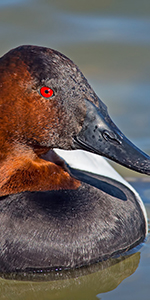| Canvasback | ||
 |
Classification(s) : | Prey |
| Cat Name : | Duck | |
| Common Name : | Canvasback | |
| Scientific Name : | Aythya valisineria | |
| Other Name(s) : | ||
| Physical Description : | The Canvasback is a large waterbird with a cylindrical body with a moderately long neck. The male has a chestnut colored head and a white body. The chest and rump is black. The female is a light brown waterbird. |
|
| Physical Statistics : | Length: 19 – 22 Inches (48 – 56 Centimeters) |
|
| Behavior : | Canvasbacks spend most of their time on the water, occasionally coming to shore to rest. They are active during the day. Their nests float. They are diving ducks, so they dive from the surface to feed. |
|
| Social Organization : | Flock; |
|
| Approval Level : | Mod; Ducks are rare due to a lack of ponds and lakes in the forest. | |
| Kill Difficulty : | Moderate; Canvasbacks are large and can deliver painful blows with their wings. |
|
| Training Level : | Specialty - Duck; A hunter needs to wait for them to come close to shore before attacking. They give an alarm cry, sending prey into hiding. |
|
| Hunting Tactic : | Waterfowl | |
| Food Quality : | High; Canvasbacks are very large meals, and can be shared by many cats. | |
